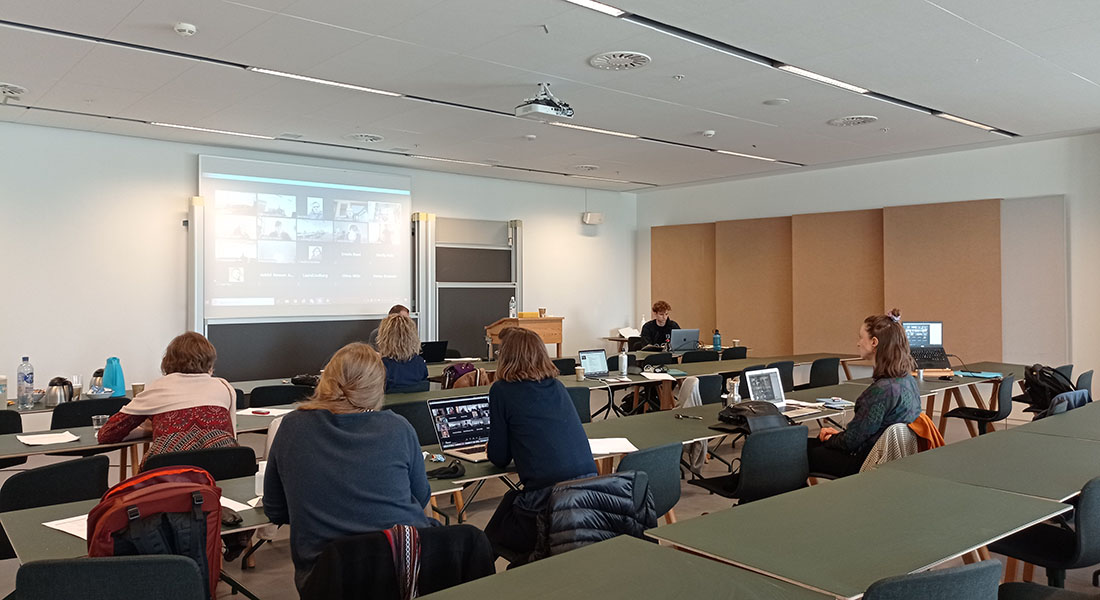Workshop report: Culture and the mind, an explorative and interdisciplinary workshop
On May 28th 2021, the interdisciplinary workshop on “Culture and the Mind” was held in a hybrid form at the Institute for English, Germanic and Romance studies at the University of Copenhagen. It was convened by Ana Antic and Peter Leese and organized in the framework of the Decolonizing Madness project.
Lamia Moghnieh

One objective of the workshop was to bring together interdisciplinary approaches to the study of culture and the mind from anthropology, history, psychology, social work, psychiatry and mental health activism. The workshop explored how the mind, psychological suffering and healing have been imagined and described across sociocultural contexts, as well as the role of cultural differences in developing different definitions of what it means to be human. Presenters reflected, each from his/her own discipline, on the conceptualizations and role of cultural and social environments in shaping core traits of human psychology and discussed the cultural embeddedness of medical and health systems.
Four sessions moderated by scholars working in different fields were organized to introduce the emerging debates and topics surrounding complex interplays between culture and the mind. The participants shared reflections and experiences from their own research and practice and contextualized and historicized different attempts at developing universal, cross-cultural definitions of the mind.
The first session, chaired by Derek Summerfield, addressed the processes of Universalizing and Translating Mental Health. Panellists Jessica Carlsson Lohmann (the Competence Center for Transcultural Psychiatry at the University of Copenhagen), Martha Karrebaek (University of Copenhagen) and China Mills (City, University of London) addressed the role of cultural humility and difference in working with trauma-affected migrants and refugees in Denmark, the centrality of language ideologies in mental health, the role of interpreters in therapeutic settings, and the ways in which universality and globality are contested, mediated and constructed in global mental health. They raised issues on the challenges of translating culture, globality and language in transcultural therapeutic settings. The presentations initiated a lively discussion across disciplinary boundaries, which focused on the role of universalism and cultural relativism in specific mental health contexts on all levels (from global mental health policy-making to individual clinical encounters). China Mills’ argument – that universalism is often associated with pragmatic approaches and efficient solutions, while cultural relativism, while recognized, is seen to lead to therapeutic nihilism, proved very valuable for understanding disagreements between practitioners and humanities/social science scholars in the field of mental health.
The second session, chaired by Laura Glahder Lindberg, reflected on the ways of Decentring Narratives of Mental Health and Illness: Agency of Survivors and Service Users. Romain Tiquet (CNRS Marseille) highlighted the relationship between patients’ families and psychiatrization in Senegal, while Ursula Read (King’s College, London) discussed her research on the historical and legal construction of the mentally ill criminal in Ghana, and examined the notions of responsibility, culpability and recovery in relation to mental illness and the cross-cultural legal framing of “guilty minds”. Finally, Ruairi White (National Survivor User Network) and Rea Maglajlic (University of Sussex), explored the lived experiences of people with mental health issues and survivor activism, asking how survivors and service users can get involved in academic and clinical discussions around mental health, and what challenges they might be facing.
The third session, chaired by Ana Antic, addressed the current topics emerging from Ethnographies of the Mind. Kirrily Pells (UCL), Vivian Dzokoto (Virginia Commonwealth University), Lamia Moghnieh (University of Copenhagen) and Sonia Cancian (McGill University) discussed topics related to different conceptualizations of the mind, suffering and emotions in an unequal dialogue between Western medical systems and local interpretations of the psyche/illness. Pells introduced the audience to her innovative work on memory and notions of trauma in relation to creative arts projects among the Rwandan youth, while Dzokoto discussed different aspects of the conceptualisation of the mind among the Akan in West Africa. Both Pells and Dzokoto emphasized the importance of alternative, non-medical narratives of the psyche, mental health and illness in specific communities, and demonstrated creative methodologies to access such narratives as researchers. Moghnieh relied on her ethnographic work in Lebanon to explore the concept of structural competence as a replacement for cultural competence in mental health practice, and to discuss the relationship between identified emotional differences in specific cultural settings and the construction of “modern and therapeutic minds”. Cancian spoke about empathy as an intersubjective narrativization of migration and the situatedness of migrant narratives “on the move”. The discussion returned to the universalization of the diagnosis of trauma, but also to the alternative concept of resilience, its benefits, limitations and challenges.
The fourth session, chaired by Peter Leese, provided an overview of Trauma and the Psyche from a Historical Perspective. Ville Kivimaki (University of Tampere), Jason Crouthamel (Grand Valley State University, Michigan), Mark Micale (University of Illinois, Urbana Champaign) and Svenja Goltermann (University of Zurich) spoke about historicizing and contextualizing trauma as an experience not reducible to its psychiatric and psychological discourses and counterparts. Kivimaki looked at traumatic symptoms in Finland in the 1940s - before the emergence and popularization of public discourses on trauma- and explored similarities between trauma responses in different historical and social settings. Crouthamel drew attention to the histories of the senses, emotions and the body (highlighting the recent turn to subjective narratives in historical research on trauma), and discussed the processes of managing and contesting the psyches of soldiers from a historical perspective. Micale focused on the historiography of the traumatized mind and its discourses and offered an overview of the cultural work of trauma from the 19th to the 21st centuries. Closing the workshop, Goltermann introduced her new project on the changing perceptions of violence, suffering and vulnerability since the 1960s, focusing on the emergence of discourses on mobbing as a form of psychological violence related to xenophobia and racism in Sweden.
